 She Who Shall Not Be Named and I trekked down to Woodruff Park last week to observe Occupy Atlanta, a protest supporting the 99%/Occupy Wall Street cause.
She Who Shall Not Be Named and I trekked down to Woodruff Park last week to observe Occupy Atlanta, a protest supporting the 99%/Occupy Wall Street cause.
First off, I’m going to outline the issues I noted with Occupy Atlanta (which may apply to the movement as a whole) and provide some thoughts on solutions. Further review of what we saw and more photos are below.
Issues
1. Participating. There are some major hurdles for people checking out the protest for the first time.
A) What “99%” means isn’t even understood by many. Some visitors claimed they were not represented by the protesters. Unless these visitors are making billions of dollars, they are merely confused as to what 99% the protesters are laying claim to.
B) The method of participation in assemblies isn’t understood either. Speakers are required to get their names on a “stack”, i.e. a list, to have a turn to speak. There are hand signs for listeners to indicate agreement, objections, point of order, etc. which are explained at the start of the assemblies, but anyone who arrives afterward is lost. Unfortunately, none of this was explained to the newbies I saw struggling to debate the issues of the moment.
C) Opposition voices are sometimes drowned out through shouting and name-calling, rather than intelligent debate.
Solution: A simple flyer explaining what 99% means, what the goals of the movement are (when/if these goals are ever decided upon), and how to participate would be a great help. One of the guidelines needs to mention simple courtesy, even with those who express differing viewpoints.
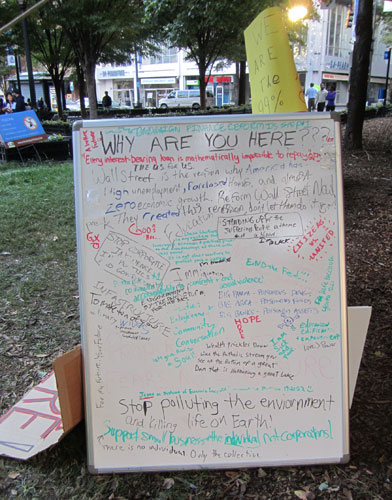 2. White noise. There are too many voices trying to be heard. Each speaker seemed to want to pull the group into new territory. Too often, this wastes time and effort, ignoring the most important issue – changing the systems that created the vast financial inequities we have in this country.
2. White noise. There are too many voices trying to be heard. Each speaker seemed to want to pull the group into new territory. Too often, this wastes time and effort, ignoring the most important issue – changing the systems that created the vast financial inequities we have in this country.
Solution: Pick some topic areas to cover. If someone wishes to speak and will not or cannot address these topics, move on. Other topics can be addressed later. But issues directly related to the economic disparities in this country come first.
Pardon me while I go on a sidetrack rant of my own, by way of example.
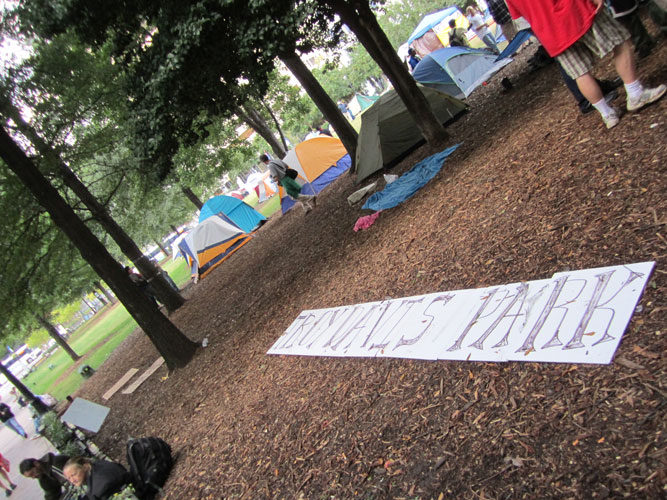
Troy Davis Park? Seriously? 99% of the people don’t have a problem with the death penalty, much less care about Troy Davis. By making this one of the first decisions of the protest, you have already lost much of your potential support. And this is just a single example. Yes, there are lots of symptoms of the financial inequities in this country that need addressing – but getting distracted from the causes of these inequities is a waste of time.
3. Image. There needs to be a broader range of faces representing the group. Unfortunately, a college-age person will never get as much respect as an older, working (or out of work) person no matter how intelligent or accurate the young person’s commentary. Marketing this movement to the masses will be difficult if the masses do not see themselves in your numbers.
Solution: A video made by the organizers showcasing a variety of the better-spoken individuals is making the rounds on youtube. It’s a start. Build from there. Find stories that are illustrative and moving – a family who have been evicted from their home after job loss, or a person who cannot afford their medication due to a lack of health insurance, while contrasting this with bank and insurance company profits. If nothing else, wear a clean shirt. This is theater. Dress to impress.
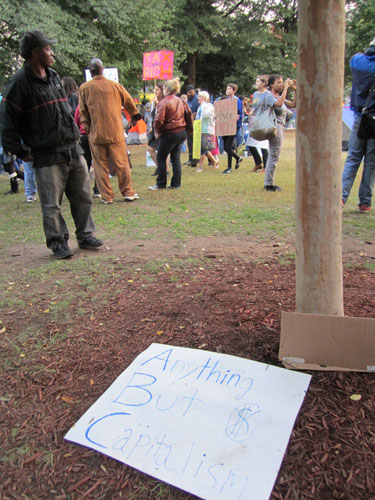 4. Extremists. Sorry, communists and anarchists, it just ain’t gonna happen in this country. Move on and work on what can be done.
4. Extremists. Sorry, communists and anarchists, it just ain’t gonna happen in this country. Move on and work on what can be done.
Solution: Organizers need to acknowledge this and stop unrealistic commentary from wasting meeting time. See #2 above. Focus, and don’t allow others to pull you off topic.
So, on to what we saw.
We visited on a rainy Thursday night. As I snapped a photo of the “Troy Davis Park” sign, an elderly woman sitting on the wall said, “You don’t know what’s going on here.”
“Yeah, I do,” I replied with a smile, “It’s Troy Davis park.”
“No, it’s a bunch of bums,” she said, gesturing to a group of what appeared to be homeless men camped on the edge of the gathering, “I’ve gone through three packs of cigarettes today and I’m just about fed up!”
She, herself, didn’t look like she had a stable residence. Already, I worried about what we were in for.
Rounding the corner, we found a group of Taiwanese youth dancing in front of a sign that told us the end times were here, or had already arrived, or something. I half expected Westboro Baptist Church to be lurking on the edge somewhere.

When we entered the park proper, the first thing I noticed was the sheer diversity of signage around.

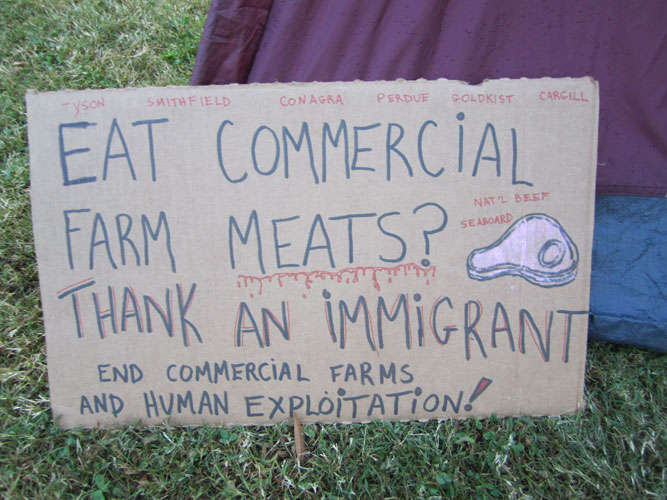

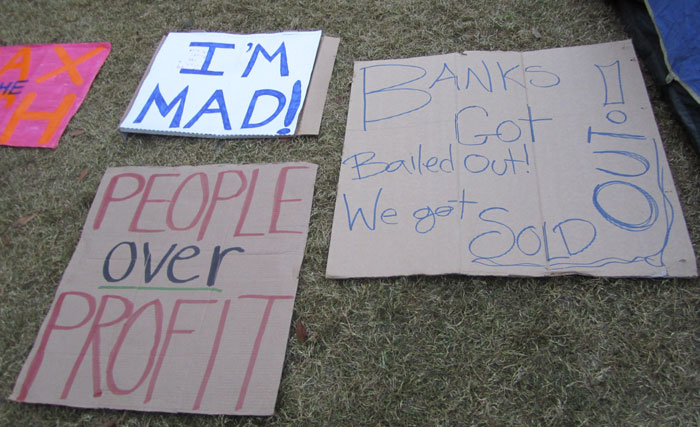
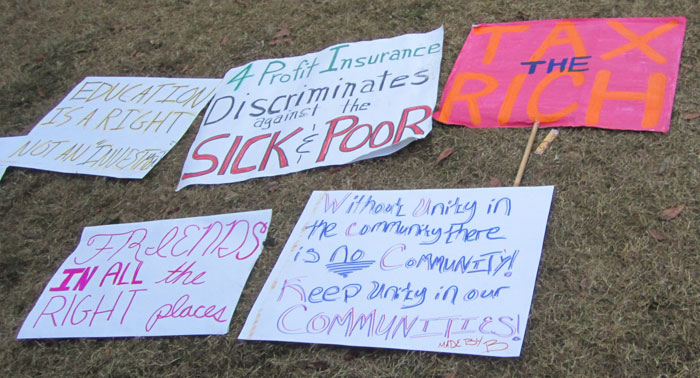
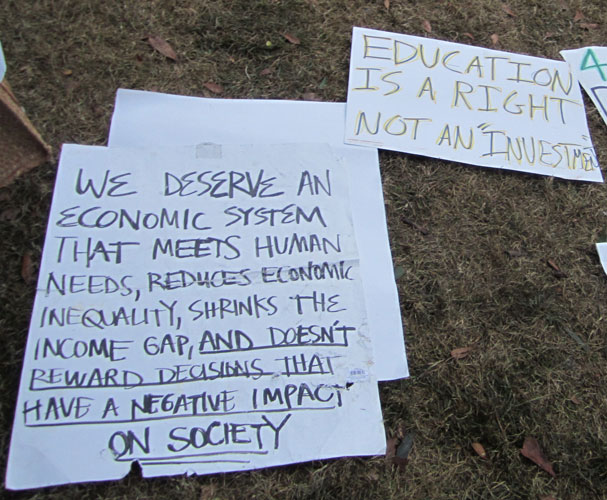
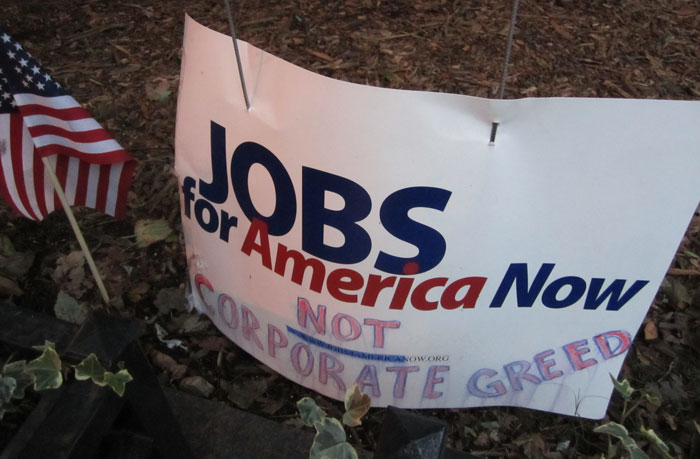
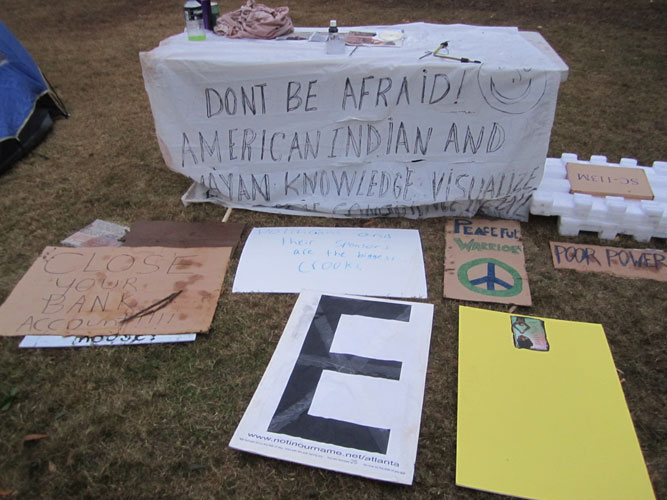
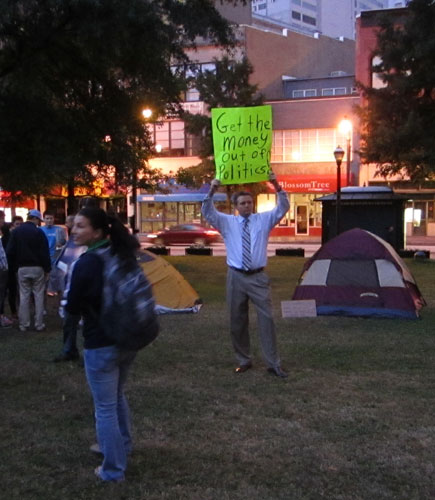 The crowd was mostly students or younger people, mostly of the hippie archetype. However, there was a bit of diversity, including a few folks that looked like they walked right out of the office to join the protest.
The crowd was mostly students or younger people, mostly of the hippie archetype. However, there was a bit of diversity, including a few folks that looked like they walked right out of the office to join the protest.
There was a drum circle, as well as a guy playing acoustic guitar and singing protest songs. A food table was stocked at random, feeding both protesters and what appeared to be a large contingent of homeless people. There were more than a few fellow gawkers and curious by-passers. I overheard conversations about race, religion, politics and more.


 There were some 50 or so tents around the park, some for occupants, others for media or meetings.
There were some 50 or so tents around the park, some for occupants, others for media or meetings.
The rules do not forbid adorable puppies in the park. This one scampered about, playing with sticks and chasing falling leaves.
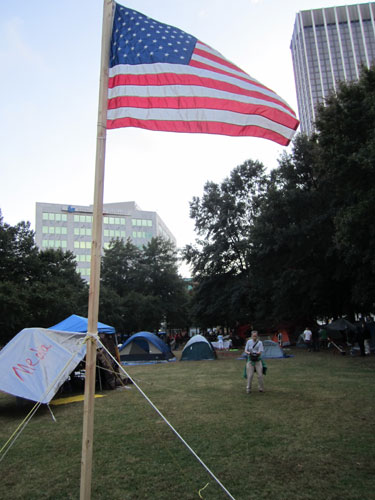 Eventually a “general assembly” was called to order under the big tent, a meeting to discuss everything from issues about staying in the park to whether cameras should be allowed at all times to the statements of commonality they wanted to use to market the movement.
Eventually a “general assembly” was called to order under the big tent, a meeting to discuss everything from issues about staying in the park to whether cameras should be allowed at all times to the statements of commonality they wanted to use to market the movement.
At the other end of the park, a few people raised a flag, as if in an effort to seem less anti-American. However, when the assembly asked to move to where the flag was erected, we overheard a participant grumble, “Yes, the colonial, imperialist flag.”
But most people seemed interested in listening and discussing, rather than tossing around inflammatory rhetoric.
The assembly broke into committees to tackle multiple topics. We went with the demands committee, as they seemed to be the ones actually discussing what the movement stood for and could do. (I’m sure other committees, from media to operations, had important things to discuss but we could only be in one place at a time.)
The demands committee had a list of five statements they wanted to get a “temperature check” on. Despite organizers consistently saying, “This is not a vote, this is just a temperature check,” it is, in every way, a vote.
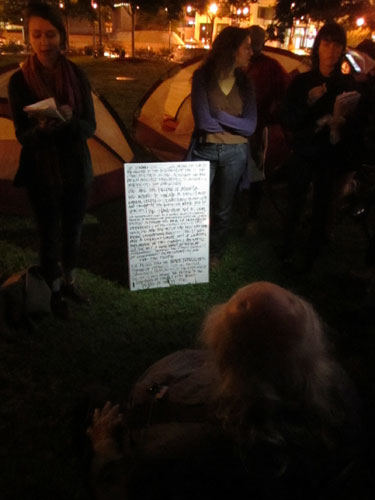 Unfortunately, this particular vote only seemed to raise the temperature of the debate. A Marxist in the meeting wouldn’t agree with any of the statements. Others picked apart the wording of each line. The whole process was interrupted by newbies, who were then shouted down and insulted. The phrase “like herding cats” came to mind. I immediately understood how the protests could be easily dismissed or mocked. Even just watching can be an exercise in tedium. Participating is frustrating.
Unfortunately, this particular vote only seemed to raise the temperature of the debate. A Marxist in the meeting wouldn’t agree with any of the statements. Others picked apart the wording of each line. The whole process was interrupted by newbies, who were then shouted down and insulted. The phrase “like herding cats” came to mind. I immediately understood how the protests could be easily dismissed or mocked. Even just watching can be an exercise in tedium. Participating is frustrating.
To get another outsider take on the proceedings, I ran after the guys who had been chased off. They didn’t understand that the 99% referred to the bulk of our society that holds a disproportionately low amount of the wealth, while the richest 1% are getting richer, and doing so at an increasing rate. “These people don’t represent me. They aren’t 99% of the people. What are there, like 100 people here?” The newbies also didn’t understand how to get on the stack, or what the stack was.
I listened to a regular protester attempt to debate with the guys for quite some time but eventually the interlopers had to split. Without anything so much as a flyer or a URL to take with them, I doubt their minds were changed in any way by the experience – more likely quite the opposite.
The demands committee ran out of time and was forced to rejoin the general assembly without narrowing down their statements of commonality.
Then the general assembly got bogged down in a debate about whether a guy from the mayor’s office would be allowed to speak without being recorded. I felt sorry for both sides here. The guy was likely told he could not appear on camera by his media relations office. Yet the protesters are right to record every interaction with government. After perhaps 20 minutes of debate, the guy from the mayor’s office gave up and left a note. (It said simply that the city council was going to hold a special meeting Monday to discuss the protest.)

Further tedious debates such as this tried our patience and we gave up, leaving before the demands committee even got their turn.
Saturday we ran into one of the demands committee members and she expressed the same frustrations we felt. Much like the current situation with the Republican Party, extremists can shout the loudest and derail any real progress. The left wing equivalent of Tea Partiers were dragging things to a standstill. Apparently being intelligent, well-spoken and attractive isn’t enough to lead a group like this – or even moderate the gathering.
So who the hell am I to give advice?
I’m a disillusioned lefty, like many people in this country. Like most people in this country, I am not opposed to corporations. I am not opposed to wealth. I believe greed is natural human instinct and that competition can be a very valuable stimulus.
However, allowing corporations to contribute to political campaigns has shifted the balance away from voters in favor of money. It is this shift that has given corporations more rights than individuals. Increasingly, corporations use political power to protect their profit margins. Environmental protection, consumer protection, workers’ rights, health care – anything that erodes the bottom line of the corporations is being sacrificed so that the shareholders get richer, while the society gets poorer.
Since our visit to Occupy Atlanta, protests have sprung up in even more cities and spread worldwide. It is interesting to see some of the issues brought forth by the protests being taken up by the mainstream media – finally. Atlanta’s version has been allowed to remain in the park, after a few bluffs by officials. (As of the time I was writing this, they have been granted another extension.)
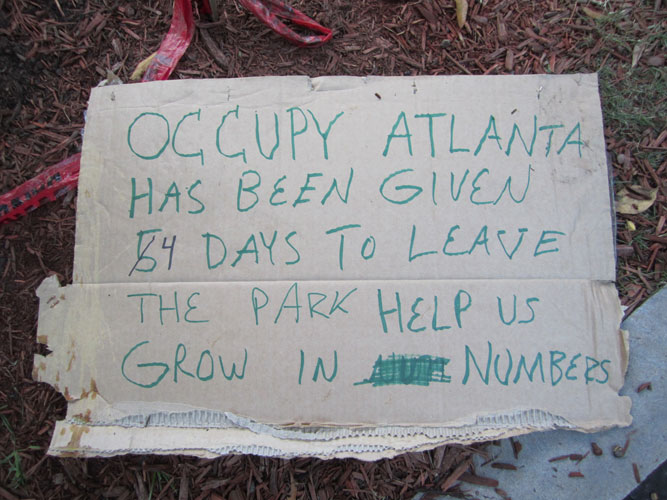
I believe if enough people become aware that the situation doesn’t have to be this way, more may take action – even if it is just to vote. Then it might spurn politicians to act.
I’m not terribly hopeful for this movement, but I am wishful.